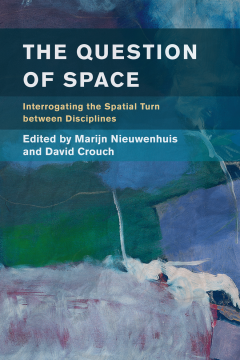
Additional Information
Book Details
Abstract
The spatial turn has been deeply influential across the humanities and social sciences for several decades. Yet despite this long term influence most volumes focus mainly on geography and tend to take a Eurocentric approach to the topic. The Question of Space takes a multidisciplinary approach to understanding how the spatial turn has affected other disciplines. By connecting developments across radically different fields the volume bridges the very borders that separate the academic space. From new geographies through performance, the internet, politics and the arts, the distinctive chapters undertake conversations that often surprisingly converge in approach, questions and insights Together the chapters transcend longstanding disciplinary boundaries to build a constructive dialogue around the question of space.
'The Question of Space' provides a rich and frequently compelling insight into how space and spatiality is put to work across disciplinary boundaries. The book offers a persuasive rationale for rethinking space and its diverse practices as fundamentally open, ungraspable, and shot-through with the affective entanglements of lives, bodies, atmospheres, energies, and the abundant materialities and immaterialities that may be found there and which make ‘there’ (or ‘here’) what it is.
The Question of Space follows in current geographical interests in the inter-disciplinary, as well as in the nonrepresentational, affective dimensions of lived experiences. Unexpectedly, given that this is not the book’s primary intention, it also engages with wider academic concerns over the hegemony of knowledge within academia and the need for research to communicate with the public.[…]At the end of the book, one is left with a better conception of the multifarious nature of space.
This deeply reflective interdisciplinary collection interrogates disciplinary expertise even as it leverages the same to insist on spacing as a matter of making singular, thoroughly shared, worlds that live and breathe. This ambitious and often lyrical effort gives us worlds that are wonderfully felicitous, but also facilitative of debates on violence and marginalisation, decolonisation and solidarity.
Deborah Dixon, Professor of Geography, School of Geographical and Earth Sciences, University of Glasgow
a refreshing inquiry into the spatial turn that goes beyond disciplinary boundary…. Started off as an accidental book project, the book disrupts the hierarchies of knowledge, and disciplinary enshrinement regarding the subject nature of space…. Overall, the book effectively ushers towards an ontology of space, where space is a discipline in its own right. The way it brings together spatial thought in social sciences and humanities, it calls for a post-disciplinary perspective. It is a compelling read, gives voice to diverse writing styles, thematic genres, and analytical lenses that bring space fully into our epistemology.
The Question of Space is a thought-provoking collection of original essays intended to shed light on how the concept of space influences contemporary scholars across disciplines. More than simply focused on the subject of space the volume casts space as a dynamic, shifting and unstable web of relations, making the spatial dimensions of our thinking explicit. Flirtatious, performative, affective, sensuous, imaginative, and political The Question of Space is not afraid to rupture existing conceptualizations of space and be playful along the way.
Phillip Vannini, Professor of Communication and Culture and Canada Research Chair at Royal Roads University, Canada
Space has long been a key concept in the social sciences and humanities, but it is frequently dismissed as too abstract as a descriptor of our worldly entanglements. This book demonstrates the continuing importance of spatial thinking for contemporary scholars, and the power of space and spatiality as plastic concepts for opening out our worlds.
Peter Merriman, Professor in Human Geography, Aberystwyth University, UK
Marijn Nieuwenhuis is a lecturer in Political Geography at the University of Warwick. His research is at the intersection of geography, philosophy and politics. His current research focuses on the ‘politics of the air’ and the political imagination of sand. He studies these two broad themes in relation to questions over the link between environmental reality and political matters concerning technology, pollution, security, territory and governance.
David Crouch’s research and writing crosses a number of fields of cultural geography, social anthropology, cultural and visual studies and art theory. These theoretical areas are engaged through an attention to contemporary cultural change, identity, human creativity, life and space encounters and relations, through ethnographies around landscape, everyday life/leisure and tourism, community involvement and the work of artists. This work includes an interest in space and gentle politics, belonging, disorientation and cultural identity, and human poetic expression in diverse forms of creativity.
Table of Contents
| Section Title | Page | Action | Price |
|---|---|---|---|
| The Question of Space | Cover | ||
| Contents | v | ||
| Acknowledgements | vii | ||
| Prelude: Playing with Space | ix | ||
| 1 Space, Living, Atmospheres, Affectivities | 1 | ||
| 2 ‘Knowing One’s Place’: Mapping Landscapes in and as Performance in Contemporary South Africa | 23 | ||
| 3 Vocalic Space: Socio-Materiality and Sonic Spatiality | 43 | ||
| 4 bell hooks’s Affective Politics of Space and Belonging | 63 | ||
| 5 As Tenses Implode: Encountering Post-Traumatic Urbanism in Ghassan Kanafani’s ʿĀʾid ila Hayfā | 81 | ||
| 6 ‘Place’ in an Inverted World? A Japanese Theory of Place | 97 | ||
| 7 The Invisible Lines of Territory: An Investigation into the Make-Up of Territory | 115 | ||
| 8 Two Internet Cartographies: Google Maps and the Unmappable Darknet | 135 | ||
| 9 Space Is No One Thing: Luring Thought through Film and Philosophy | 151 | ||
| 10 Mayday – A Letter from the Earth | 167 | ||
| Postlude: And… And… And… | 181 | ||
| Index | 191 | ||
| Notes on Contributors | 199 |
